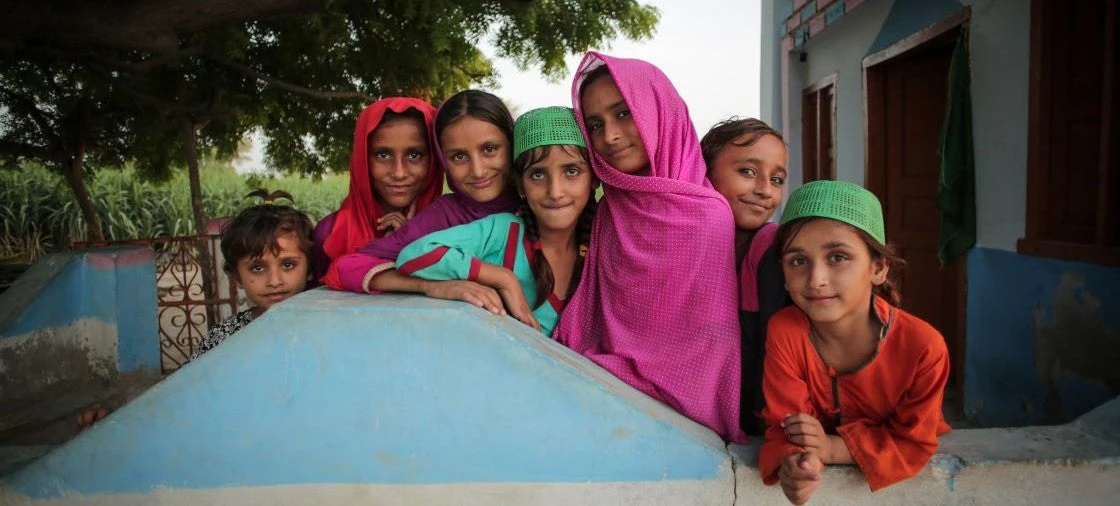 Picture of children in Sindh, Pakistan
Picture of children in Sindh, Pakistan
Pakistan is at a critical decision point. Economic policies over past years and decades have had negative impacts on living standards, the private sector and the environment, driving a deep crisis that is hitting ordinary Pakistanis harder than ever before. Pakistan has fallen behind its peers, progress with poverty reduction has reversed and the benefits of growth have accrued to a narrow elite. Inflation is at record highs, the rupee has depreciated sharply and foreign exchange reserves remain at precariously low levels. Pakistan is heavily exposed to climate change, with the potentially devastating impacts of climate shocks and natural disasters already apparent. There is broad consensus that action is needed.
Many countries, including Indonesia, India and Vietnam, leveraged similar crises to pursue deep economic reforms, resulting in step changes in growth and substantial and sustainable improvements in living standards. Pakistan could do the same. World Bank analysis shows that, with the right policies in place, Pakistan could achieve upper-middle income status by 2047, the centenary of independence. It is now time for Pakistan to decide whether to maintain the patterns of the past or boldly move towards a new economic paradigm.
World Bank analysis shows that, with the right policies in place, Pakistan could achieve upper-middle income status by 2047, the centenary of independence
The World Bank has consistently argued that several major policy shifts are urgently required to unleash Pakistan’s enormous potential. First and foremost, Pakistan’s desperately low quality of basic services must be addressed. A staggering forty percent of children under five suffer from stunted growth in Pakistan and there has been little progress in reducing child stunting over the past three decades. The impacts of stunting are largely irreversible, damaging a child’s cognitive and physical capacity, leading to lower educational attainment, lower productivity and reduced income earning potential. And 79 per cent of ten-year-old children are unable to read and understand a short age-appropriate text by age 10. Nearly seven per cent of children do not survive until their fifth birthday. Reforms are required to expand access to water and sanitation in the face of climate change; enhance the coverage, adequacy and efficiency of the social protection system; and address policy and institutional constraints to effective service delivery. Failure to address this crisis comes at enormous human costs, while also undermining Pakistan’s capacity to compete and thrive in the global economy.
Reforms are required to expand access to water and sanitation in the face of climate change; enhance the coverage, adequacy and efficiency of the social protection system
Second, fiscal management must be improved. Pakistan’s fiscal deficit has been persistently large and growing, driving debt to unsustainable levels, and constraining resources with which to protect human development, address economic challenges and adapt to a changing climate. High government consumption, often driven by the political cycle, has increased demand for imports, contributing to current account deficits and periodic balance of payments crises. Fiscal reforms are required to consolidate and improve the quality of government spending, including by cutting allocations to regressive and distortionary subsidies. Revenue performance must also be improved through reducing exemptions and expanding the tax base to include adequate taxation of land, assets and environmentally damaging activities.
Thirdly, improved living standards will require a more dynamic and open economy. Current economic and trade policies distort markets, preventing resources from being allocated to their most efficient use and encouraging environmentally damaging production techniques. Periodic overvaluation of the exchange rate, trade protectionism, a difficult business regulatory environment and the large presence of the state within the economy limit commercial opportunities and encourage investment in less productive activities and sectors. Perhaps most critical, only around 25 per cent of women participate in the labor force. No economy can sustainably grow when more than half the population lacks access to economic opportunities. Reforms to trade policies, efforts to cut red tape and bold efforts to improve the efficiency of SOEs (including through selective divestment) are urgently needed.
Only around 25% of women participate in the labor force. No economy can sustainably grow when more than half the population lacks access to economic opportunities
Finally, policy failures and distortions in the critical agri-food and energy sectors must be addressed. In agriculture, reforms are required to unwind the subsidies and price restrictions that lock smallholder farmers into a low-value farming system encourage resource-intensive and environmentally damaging production practices and undermine innovation and diversification. Reforms in the energy sector should consolidate progress towards financial sustainability, improve the efficiency of distribution companies (including through increased private participation) and address the very high costs of electricity generation through increased renewable generation, while protecting poor and vulnerable households from price increases.
The need for such policy shifts has been well established not only in previous World Bank analysis, but by numerous local experts and commentators. While most agree on the need for reform, the devil is in the detail, and experience shows that any reform efforts will face contestation and opposition. The question is now whether those with power and influence will take the opportunity arising from crisis to make the decisive policy shifts that are needed. Under a new program, Reforms for a Brighter Future, the World Bank has been bringing together a broad range of experts, academics, policymakers and ordinary Pakistanis to discuss the need for change and how it can best be pursued. This conversation is continuing over the weekend at a policy conference in Islamabad. But if discussions among experts at conferences was the answer, the problems would have long been solved. The ultimate choice to navigate towards a brighter, more prosperous and more sustainable future is in the hands of Pakistan. It’s time to decide.
Under Reforms for a Brighter Future, the World Bank has been bringing together experts, academics, policymakers and ordinary Pakistanis to discuss the need for change and how it can best be pursued
This blog was originally published as an op-ed in The Express Tribune newspaper on September 23, 2023, here. For more information on the Reforms For Brighter Future Campaign, please visit its website here.


Join the Conversation